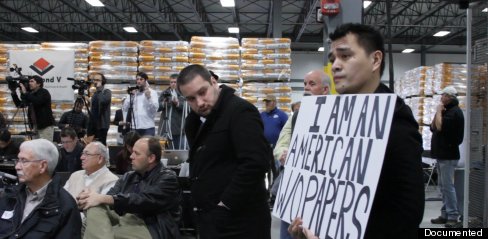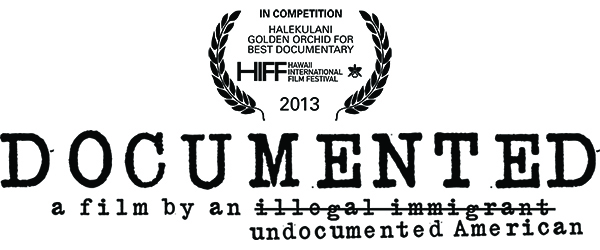Among the first results when you Google "Hawaii illegal immigration" is this question on Yahoo! Answers: "Can an illegal alien travel to Hawaii?"
Indeed.
In fact, as I write this, I am on my way to the Aloha State to participate at this year's Hawaii International Film Festival (HIFF), which is screening "Documented" -- a documentary that I, an undocumented American, wrote and directed about illegal immigration, arguably the most controversial yet least understood issue in American economic, cultural, and political life. But I am not "illegal" -- the action is illegal, not the person. No kid sitting in a classroom should be referred to as "illegal." And there's nothing "alien" about growing up, going to school, and, for years, working, paying taxes, and contributing to the United States -- in my case, as a journalist and filmmaker. Long before our collective conversation on immigration was dominated by the U.S.-Mexico border, long before we fixated on the "illegal" in our minds, parents from all corners of the world sent their children to America for a better life.

"Documented," more than two years in the making, tells a very specific but universal story of what it's like to live as one of our country's 11 million undocumented immigrants, many of us Americans in all but papers. The film follows my "coming out" about my immigration status in an essay for the New York Times Magazine in June 2011 and my subsequent interactions with law enforcement and immigration officials. (The Obama administration is on track to have deported 2 million immigrants in five years -- a record. For reasons I explore in the film, I have not been deported.) I travel to Alabama, which, two years ago, enacted the harshest, anti-immigrant law in the country, and to Iowa, crashing a Mitt Romney presidential campaign rally. The film also travels where I physically cannot go: the Philippines, where I was born and where my mother still lives. To give me a better life, Mama sent me to live with her parents in California -- both naturalized American citizens -- in 1993, when I was 12. I have not seen Mama in person since; I cannot leave the U.S. because there's no guarantee I'd be allowed back, and like many others, Mama is waiting for her visa to be approved to come here legally. (She's been denied a tourist visa.) To me and countless others, a broken immigration system is not a Latino/border/partisan issue -- a broken immigration system means broken families and broken lives.
I am honored and humbled to bring "Documented" to Hawaii, which holds a very special place in my heart. I first visited the state in the spring of 1999 -- two years after I found out that I didn't have the right papers to stay in the U.S. The Mountain View High School Madrigals, my choir group, was scheduled to go to Japan for our spring tour that year. But when I confessed to Jill Denny, the choir director, that I didn't have proper documentation to travel outside of the United States, she decided to take the choir to Hawaii instead. "I didn't want to leave any of my students behind," she explained to me years later. I will never forget looking at Mrs. Denny's eyes as we sang and competed at the Polynesian Cultural Center, just as I will never forget her generosity in quietly but resolutely coming to my aid. Mrs. Denny is among the countless Good Samaritans across the country -- teachers, neighbors, co-workers and friends -- who serve as powerful allies to undocumented immigrants.
Hawaii also holds a distinct place when it comes to immigration and the urgent need for reform. As the only U.S. state made up entirely of islands, Hawaii's immigrant history is rich and diverse, from the Europeans (known as "haole," which translates to outsiders or non-Hawaiians) to the Koreans, Tongans, Filipinos, and Mexicans who comprise a sizable part of the state's documented and undocumented immigrant population. According to the Pew Hispanic Center, undocumented workers make up nearly 5 percent (about 30,000) of the state's workforce and about 3 percent (about 40,000) of Hawaii's population--an estimated 6,000 of whom are undocumented young people known as DREAMers. Last year, the Obama administration, under pressure from immigration advocates and organized DREAMers, established Deferred Action for Childhood Arrivals (DACA), a temporary, two-year reprieve -- including a work permit and a driver's license -- to any undocumented resident who was under age 31 as of June 15, 2012 and was brought to the U.S. before age 16. But a year since DACA was implemented, only 247 (about 4 percent) of eligible undocumented youths in Hawaii have applied, according to the non-partisan think-tank Migration Policy Institute. Though the majority of the state's immigrant population is from Asia, most DACA applicants in Hawaii are Mexican, underscoring a challenge in engaging the state's Asian population.
When it comes to immigration reform, how do we reach out to Asian groups -- particularly Filipinos, who make up a significant part of the undocumented population here in Hawaii and across the United States?
Given the political stalemate and dysfunction in Washington, D.C., what can state officials do to alleviate the struggle of Hawaii's undocumented population? Should Gov. Neil Abercrombie follow in the footsteps of Gov. Jerry Brown, who last week signed a bill granting licenses to undocumented drivers in California?
How can Hawaiians have a more honest and inclusive conversation on immigration? How do Hawaiians define "American"?
These are among the questions I'd like to discuss following the three screenings of "Documented" at this year's HIFF -- two in Honolulu, and one in Kauai. You can find more details on the screenings here.
We cannot solve a problem we can't fully face.

